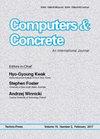用软计算方法预测GFRP筋在混凝土梁中的粘结强度
IF 3.3
4区 工程技术
Q2 COMPUTER SCIENCE, INTERDISCIPLINARY APPLICATIONS
引用次数: 10
摘要
混凝土与钢筋之间的粘结是影响钢筋混凝土构件性能的主要因素,由于钢筋腐蚀降低了粘结强度,因此研究混凝土与GFRP筋的粘结性能是十分必要的。在本研究中,收集了112个劈裂破坏模式下GFRP筋拼接加固混凝土梁试件数据库,并用于估算混凝土-GFRP筋的粘结强度。本文旨在采用多变量自适应回归样条(MARS)、克里格(Kriging)和M5模型树三种软计算模型,准确估算混凝土梁中GFRP筋拼接的粘结强度。由于正则化参数的选择对MARS、Kriging和M5模型的拟合影响较大,因此我们对正则化参数进行了优化,使训练数据的收敛系数最大化。提出了三种混合模型耦合软计算方法和遗传算法,自动进行试错过程,寻找合适的建模正则化参数。结果表明,所建模型的预测精度较已有模型有显著提高。与之前的最佳模型相比,提出的MARS、Kriging和M5模型分别提高了约65%、63%和49%的收敛系数。本文章由计算机程序翻译,如有差异,请以英文原文为准。
Bond strength prediction of spliced GFRP bars in concrete beams using soft computing methods
The bond between the concrete and bar is a main factor affecting the performance of the reinforced concrete (RC) members, and since the steel corrosion reduces the bond strength, studying the bond behavior of concrete and GFRP bars is quite necessary. In this research, a database including 112 concrete beam test specimens reinforced with spliced GFRP bars in the splitting failure mode has been collected and used to estimate the concrete-GFRP bar bond strength. This paper aims to accurately estimate the bond strength of spliced GFRP bars in concrete beams by applying three soft computing models including multivariate adaptive regression spline (MARS), Kriging, and M5 model tree. Since the selection of regularization parameters greatly affects the fitting of MARS, Kriging, and M5 models, the regularization parameters have been so optimized as to maximize the training data convergence coefficient. Three hybrid model coupling soft computing methods and genetic algorithm is proposed to automatically perform the trial and error process for finding appropriate modeling regularization parameters. Results have shown that proposed models have significantly increased the prediction accuracy compared to previous models. The proposed MARS, Kriging, and M5 models have improved the convergence coefficient by about 65, 63 and 49%, respectively, compared to the best previous model.
求助全文
通过发布文献求助,成功后即可免费获取论文全文。
去求助
来源期刊

Computers and Concrete
工程技术-材料科学:表征与测试
CiteScore
8.60
自引率
7.30%
发文量
0
审稿时长
13.5 months
期刊介绍:
Computers and Concrete is An International Journal that focuses on the computer applications in be considered suitable for publication in the journal.
The journal covers the topics related to computational mechanics of concrete and modeling of concrete structures including
plasticity
fracture mechanics
creep
thermo-mechanics
dynamic effects
reliability and safety concepts
automated design procedures
stochastic mechanics
performance under extreme conditions.
 求助内容:
求助内容: 应助结果提醒方式:
应助结果提醒方式:


